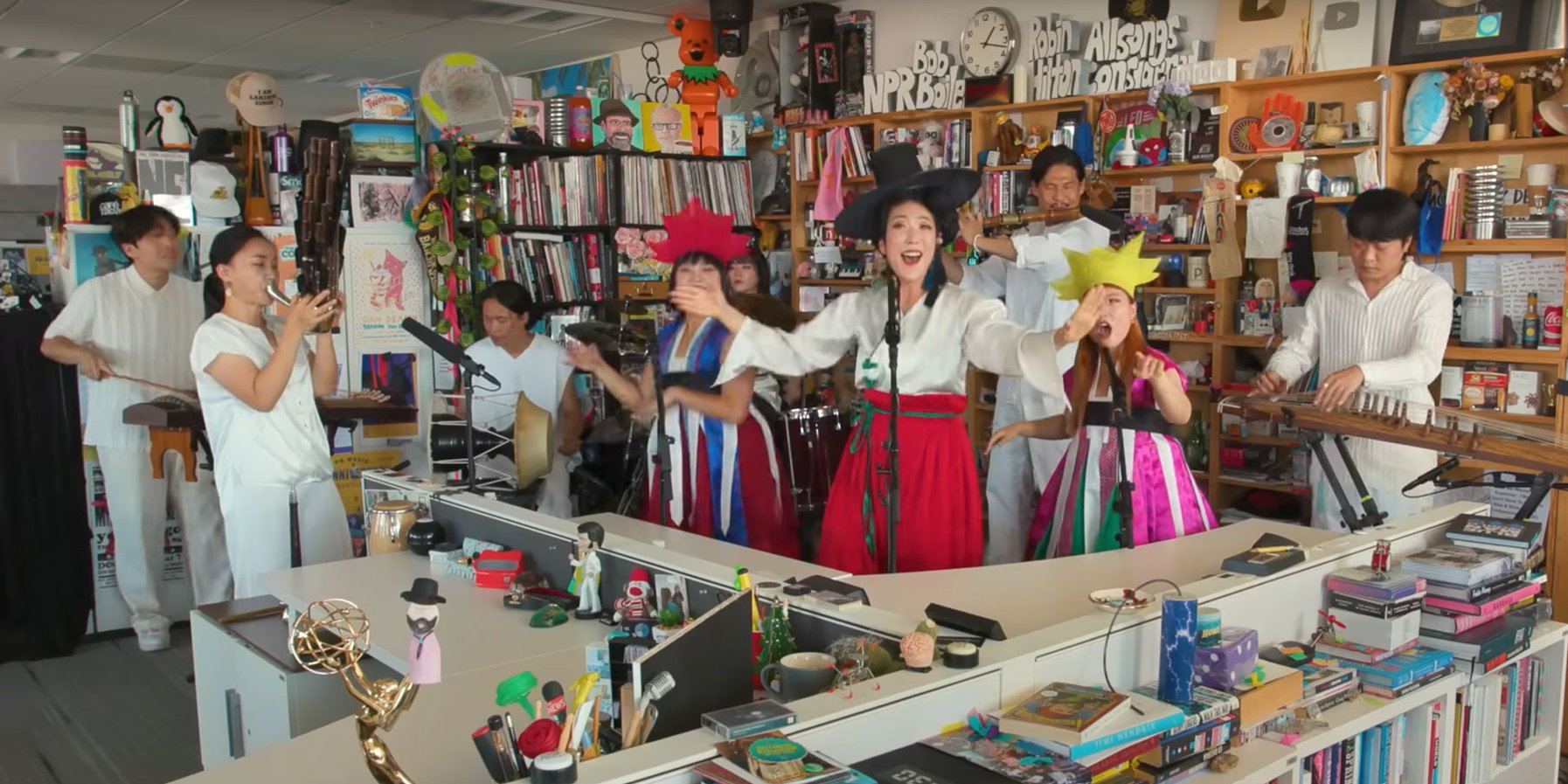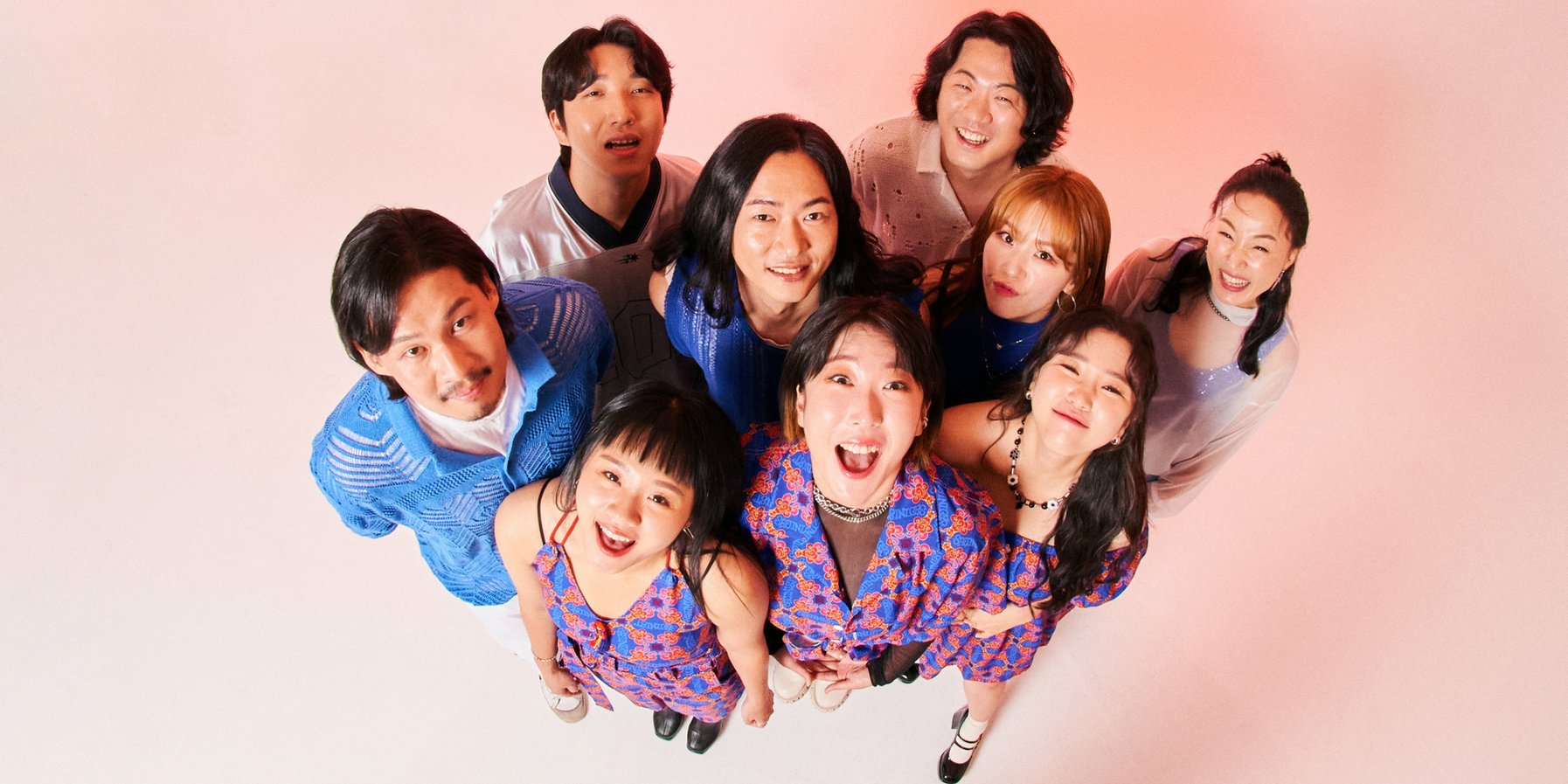Text: Julika von Werder; 26.2.2024
The band ADG7 in the »Tiny Desk Concert«, a popular YouTube format from Washington, D.C.: no fewer than nine young people with unusual instruments and colourful stage outfits squeeze around the tiny desk of radio presenter Bob Boilen - a rare sight that pushes the cramped studio to its logistical limits. The video description states that the Seoul-based group combines traditional shaman music with Korean folk songs.
The unusual name is also promptly explained: ADG7 is the abbreviation for »Ak Dan Gwang Chil« . »Ak Dan« simply means »music band«; »Gwang Chil«, or »G7« for short, stands for the 70th »Gwangbokjeol« – Korea’s National Day of Liberation from the colonial power Japan, which is celebrated on 15 August in both South and North Korea; the band was founded on this day in 2015. So you might expect traditional Korean music from this group, with a more political focus.
But you’re in for a surprise: lead singer Hong Ok introduces the band to the camera with a big smile as the »best band in the world«; her two colleagues join in exuberantly before they surrender to the surprisingly fast beat of the accompanying combo. It soon becomes clear that ADG7 are not delivering a reverent performance of old musical traditions, but party music like you’ve never heard it before.
The best of two worlds
The unique feel-good sound of the nine-piece band is not easy to describe: For today’s teenage K-pop fans, it offers too much folk and may be too slow, while for listeners interested in history, it’s probably far too much party. Put positively, ADG7 combines the best of two worlds. These are pop beats with a background, ancient traditions cheerfully translated into the present.
»We’re not just the K-pop band that your little daughter listens to,« emphasises the group, which sees the folk-pop genre as its home. »Our aim is to take Korean culture and shamanism in particular and develop a sound and live shows that blow today’s audience away.« In other words: danceable pop, eye-catching instruments with unusual sounds, simple Korean lyrics and seductively transcendent shamanism music. »Korean psychedelic« is how they summarise it.
»You guys are crazy«
And the band name? It’s not meant as a programme, as the musicians emphasise in the written interview. The bank holiday was merely a personal occasion, and the band’s formation was not politically motivated. The play on the number 7 and the pronunciation »Gwang Chil» is a little gag; the combination of capital letters and numbers is not uncommon among today’s successful K-pop groups. »This band was not born out of a serious or formal mood,« the musicians emphasise. What’s the biggest compliment you can pay them after a show? The answer is clear: »You guys are crazy!«

Crazy or not – all the members of the band have a training in traditional Korean music, even if they have always listened to everything from the Beatles to Coldplay in their private lives. They got to know each other in the professional ensemble Jeong Ga Ak Hoe, which specialises in traditional music, and they produce the groovy ADG7 sound exclusively on the instruments of their centuries-old culture. The current line-up includes Hyun Soo Kim’s bamboo flute, the traditional Central Asian reed instrument piri and two different arched-board zithers.
Hyang Hee Lee’s mouth organ is particularly eye-catching, with its 17 pipes of different lengths producing a uniquely penetrating sound. »Because all these instruments were around long before today’s large concert halls and, above all, long before modern recording equipment was invented, it wasn’t so easy to record or amplify their unique sound properly,« explains band leader Hyun Soo Kim.

The comeback of the shaman cult
The fact that the band is revitalising the ancient shaman cult is by no means an exception in Korea. On the contrary: shaman rituals have been experiencing a real comeback in the high-tech country for some time now. A wide range of offers, some of them commercialised, appeals to people as an antidote to the stress of modern life. Many people seek refuge and advice in various situations from shamans, who are seen as mediators between this world and the hereafter, as a medium between heaven and earth. This includes making prophecies as well as dance rituals or driving out evil spirits. »They comfort and alleviate a person’s pain through certain rituals,« explains flautist Hyun Soo Kim. »And so our music also celebrates togetherness. We sing and dance together, reminding ourselves that we are not alone. We become one through music. That is our mission.«
The traditional shaman rituals – known as »gut« – vary greatly depending on the region and the occasion. The musicians of ADG7 primarily use rituals originating in what is now North Korea. »Compared to other regions, this North Korean shaman music is known for its simple, repetitive structure and powerful percussion sound,« explains singer Chorong Bang.
The longing for reunification
Does their turning towards North Korean culture also echo the longing for reunification? She is convinced that »that is the wish of all Koreans«. »Traditional songs are proof that South and North Korea have used a common language, the same instruments and songs – and that we are one. Our music today sings of the connection between all beings, regardless of nationality.« Perhaps their approach is not entirely apolitical, after all. In any case, it’s certainly not without social relevance when a South Korean band sets out into the wide world to play North Korean music.
This article appears in the Elbphilharmonie Magazine (2/24)
Translation: Clive Williams
- Elbphilharmonie Kleiner Saal
ADG7 – Korean Shamanic Folk-Pop
Hamburg International Music Festival






